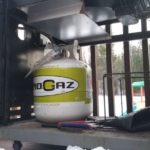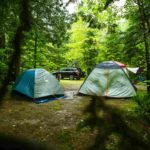Winter Camping is an Adventure
Winter camping is an adventure not meant for the faint of heart. It takes a solid amount of thought and planning. But no matter how much time and effort you put into organizing your trip, there are always certain things you’ll forget about or can just do better the next time around.
We’ve compiled a list of a few of the winter camping tips and hacks that you might not be looking for but will be thankful that you found. Some of these you may have seen before. But we’re sure there will be at least a few new ones you’ve never come across. Hopefully they will be valuable to your next winter camping excursion.
Bring Snowshoes
If you’re an experienced winter camper you already know this. However, new campers might be overlooking the walk in and this is one winter camping tip you can’t do without.
If you’re camping in an area with a lot of snow, pack a good pair of snowshoes for the walk in. Snowshoes make travelling in deep snow so much easier and you’ll want to preserve as much energy as possible so that you’re not exhausted when you arrive and need to set up camp. Take along a couple of extra shoe straps as well in case one breaks. There’s nothing worse than a snowshoe dangling from half of your foot.
Pulk Sled Size
If you’re bringing along a lot of heavy gear, you’ll want to bring along a pulk sled rather than backpacking everything in. A pulk sled will lighten the load to help ensure you aren’t breaking through deep snow, making the walk extra difficult. You can fix it to your body using shoulder or waist straps which makes pulling much more manageable.
One thing to keep in mind when selecting a pulk sled is that it should be narrower than the snowshoe trail you are packing in front of it. If the sled is too wide you’ll constantly be pulling it on one edge as it slips in and out of your trail.
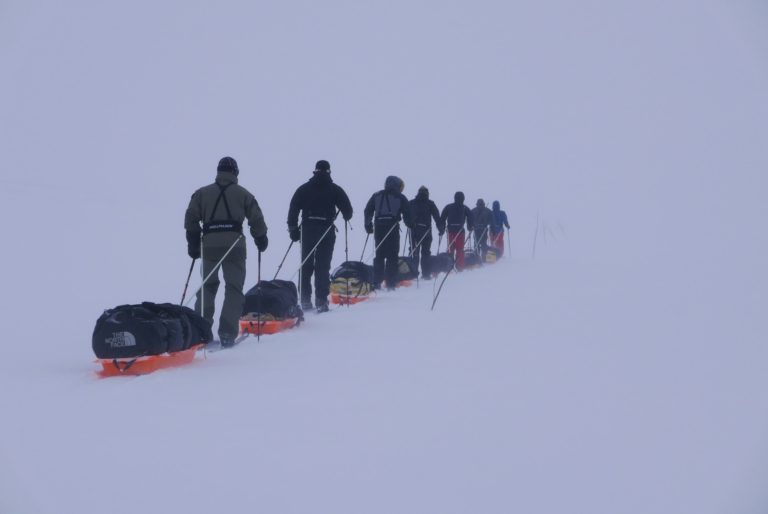
Pack a Shovel
Bring along a compact shovel to move snow and level and pack the ground you’ll be setting up on. It doesn’t have to be anything too extraordinary but will be so much easier than kicking snow around with your boots.
Strong Tent Anchors
Hammering plastic tent anchors into the frozen ground just won’t work. In fact, avoid tent anchors that have any plastic parts as they will be prone to breaking and shattering as they become brittle in the cold.
Look for metal spikes or anchors that twist into the ground. It will be easier to twist them into the frozen landscape and they will hold well, even in high winds.
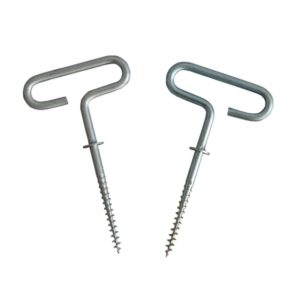
Two Sources to Start a Fire
If you can’t get a fire started, chances are you’ll be heading back home the same day you arrived. Be prepared to have your first choice of fire starter fail and resort to your second option. If your bic lighter gets wet, come ready with a backup plan like matches, a flint fire starter, zippo lighter, torch or whatever else you may have.
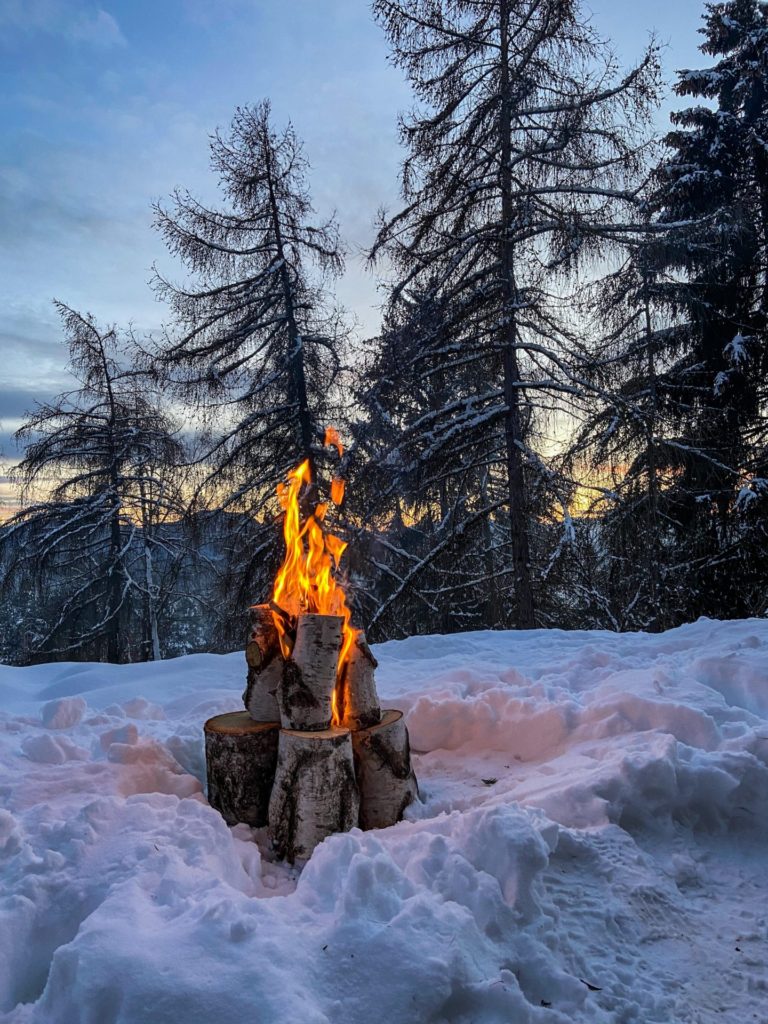
Winter Camping Tips to Protect Your Skin
Frostbite Protection
Getting frostbite is another one of those unwanted incidents that can quickly put a damper on your trip. Cover up any exposed skin with a product such as Dermatone spot protection. Vaseline also works well as do many other creams and ointments. The purpose is to provide a defensive layer between your skin and the elements and many products will do the trick.
Avoid Sunburns
Many people forget about the sun in the winter months as you don’t feel the heat from it as much. Nevertheless, the sun is still strong and damaging to your skin during the winter. This is especially true as the days get longer through February and March. Make sure to apply sunscreen if you’ll be out in the sun for long periods of time.
Minimize Tent Condensation
While you sleep you’ll be breathing out warm air into the cooler night air. As the warm air rises to reach the cold ceiling of your tent, it will form condensation which can then freeze and or drip back down, soaking you and your gear.
In order to minimize the amount of warm air that can escape and rise, place a fabric material over your mouth and nose which will trap the moisture as well as keep your face warm. Things like scarves, wool or a t-shirt provide enough breathability to remain comfortable while also reducing the chance of condensation forming on your tent ceiling.
Stay Warm – Keep Moving
If you’re on a winter camping excursion you can expect it to be cold out. Lounging and relaxing is more of a summer camping type of thing anyway. Winter camping is about survival and adventure. Staying warm will be one of the most important measures for any winter camping trip.
One easy way to stay warm is to generate your own heat by staying active. Plan to hike, gather firewood and make changes to your campsite during the day. At night, stay warm by the fire and complete a quick exercise right before packing in for the night. Do a few sit ups or jumping jacks and you will generate enough heat to stay warm for a while.
Snack Often
If you’ve been moving around alot during the day in order to stay warm, you will need to make sure to refuel your body so that you have plenty of energy and don’t burn out. Bring along snacks that are high in protein, fats and carbohydrates for a boost of energy.
Also, don’t forget to drink plenty of water to stay hydrated. You may not feel as thirsty on a cold winter’s day, but your body still needs fluids so drink regularly.
Keep Water Filters From Freezing
If you’re going to stay hydrated, you’re going to need to make sure that your water filtration system doesn’t freeze which can also cause it to crack or shatter. Wrap filters in a sock or sleeping bag when not being used and store in the warmest area of your tent. Also drain as much water as possible from it to reduce the chances of damage if it does freeze.
If you’re taking along water bottles rather than a filter, store the bottles upside down as water freezes from the top down. This will increase the likelihood that when you flip the bottle back over, you’ll have at least some amount of water available at the top of the bottle for drinking.
Drying Wet Boots in Freezing Temperatures
Wet boots in the middle of a winter camping trip is not ideal to say the least. However, sometimes it is unavoidable. To dry wet boots while the temperature dips overnight, hold the boots open as wide as possible using a stick and place them in a well ventilated area overnight. This will allow maximum airflow through the boot and although they may not be perfectly dry come morning, they will be much improved. Hope for some sun the next day to finish off the drying process.
Keep Tomorrows Clothes Warm
The theme here is staying warm and keeping energy levels high. As such, many winter camping tips revolve around these essentials as they can be the difference between a second winter camping trip and selling all of that high end gear you just bought.
Waking up and leaving your warm sleeping bag might be the worst part of your trip. But waking up and putting on frozen clothes would be even worse. To avoid this, place tomorrow’s clothes in your sleeping bag with you overnight. This way they can help keep you warm as you sleep and will also be nice and toasty when you put them on the next day.
Warm Boots – Warm Feet
This might be one of my favorite winter camping tips to keeping gear warm. While you sleep, remove dry liners from your boots and place them in your sleeping bag as well in order to keep them warm.
In the meantime, heat a few rocks up by the fire and wrap them in tin foil. Place the heated rocks inside your boots. The rocks will hold heat for a long time and keep your boots from freezing overnight.
Winter Rated Sleeping Pad
Having a -20C rated sleeping bag is great, but if you can’t get a little separation from the ground, you’ll feel the cold of the frozen dirt beneath you all night. Invest in a winter rated sleeping pad that gets you away from the ground and provides a little added comfort at the same time.
Protect Yourself From Carbon Monoxide
One of the most important winter camping tips we can provide is to protect yourself from carbon monoxide if you’re burning fuel inside your tent. While it’s true that tents themselves are vented, you can never be too safe when dealing with this silent killer. Get yourself a carbon monoxide detector and place it inside your tent for reassurance.
Stay Entertained
This winter camping tip is designed more for your sanity then your survival.
During the day there will be so many things to do to occupy your time. From gathering wood to hiking, fishing, and preparing meals. In contrast the nights can be long if you don’t have things to do while inside your tent. Pack a deck of cards, a book or even your phone or tablet to watch a movie and pass some time.
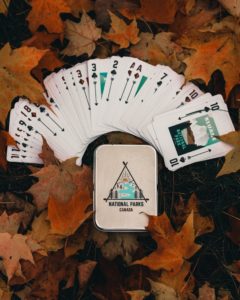
Drying Your Tent at Home
Everybody loves the adventure, but hates the cleanup. If you want to avoid a musty, moldy tent the next time you head out, it is absolutely necessary to dry it out thoroughly. There are several ways to accomplish this:
- Setup the tent or hang it in a spare room in the house. A nice, warm room that gets a lot of sunlight will help the tent dry faster. Place a dehumidifier near it to really get the moisture out quickly. Setting up a fan near it works well too.
- Hang it in the garage. Install hooks from the garage ceiling and hang the tent so that it is spread out and open. A heated garage works best as the tent can dry faster, but even if it isn’t heated, the airflow through the garage will allow the tent to dry, even in freezing temperatures. Open the garage doors to promote additional airflow.
- In the bathroom. Hang the tent from the shower curtain and turn on the bathroom fan. This may take a while but does work if other options aren’t possible.
- Let the sun do it. Set your tent up on a deck or in the backyard on a sunny day and let the sun do all the work.
Tell Someone Your Plan
If you’re going out on a winter camping trip, understanding the dangers is of the utmost importance. Tell someone your plan. Write it down and give it to them. Let them know where you’re going and how long you’ll be gone. If you know some specifics like GPS coordinates, include that information. You just never know what could happen, and your chances of survival will be greatly increased if someone knows where to start looking should you run into trouble.
Soak in as Much Info as Possible
While we hope that you’ve learned at least a couple of new winter camping tips from this piece, it is in no way a comprehensive list of everything you need to know before venturing out into the wilderness in below freezing temperatures. Luckily, there are a lot of great resources like REI and MEC that provide tons of information on things like winter camping gear, setting up your camp in the snow and preventing cold injuries.
Research, research, research! And then research a little more until you are confident that the knowledge you have will get you through a night in the cold, dark wilderness.

